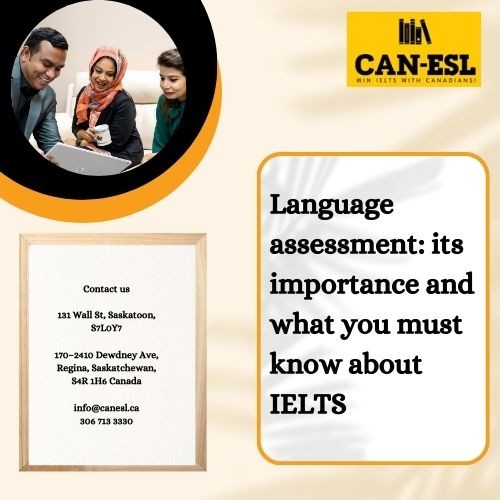Blogs
All fees are in Canadian Dollars.All fees are what you pay. There are no additional taxes or charges.
Read More

Language
Assessment: Its Importance and What You Must Know About IELTS
One of the
most widely recognized and respected language tests is the International
English Language Testing System (IELTS). This blog post explores the
significance of language assessments and provides a comprehensive overview of
IELTS, including how to prepare effectively for it.
1. Understanding
Regional and Dialectal Variations
Language
assessments help identify and acknowledge regional or dialectal differences in
language use. This is crucial in diverse linguistic environments where
understanding subtle variations can impact effective communication. For
instance, English speakers from different parts of the world might use distinct
phrases or idioms that can be crucial for mutual understanding in international
contexts.
2. Guiding
Your Learning Journey
A language
assessment provides a benchmark for your current proficiency level. This allows
you to set specific goals, track your progress, and stay motivated throughout
your learning journey. By identifying your strengths and weaknesses, you can
focus your efforts more effectively and make informed decisions about your
learning path.
3. Enhancing
Cultural Awareness
Many
language assessments include cultural components, which help you become more
aware of cultural nuances and sensitivities. Understanding cultural context is
not only important for effective communication but also for fostering
respectful and meaningful interactions in diverse settings.
4. Certifying
Progress in Language Learning
Whether you
are learning English, French, Spanish, Japanese, or any other language,
official tests are crucial for certifying your progress. Each language has its
own set of assessments designed to measure different competencies. These tests
help learners demonstrate their abilities and provide teachers with insights on
areas that need further development.
5. Providing
Feedback for Educators
Test results
are valuable for educators as well. They help teachers identify whether
additional resources or personalized instruction is needed. This feedback is
essential for improving the effectiveness of language instruction and ensuring
that learners receive the support they need to succeed.
6. Placing
Individuals in Appropriate Programs
Language
assessments are used to determine a person’s proficiency level, which is
critical for placing individuals in appropriate courses or programs. This
ensures that learners are in environments that match their skill level, which
promotes effective and targeted learning.
7. Supporting
Research and Policy Development
Language
assessments contribute to research on second language acquisition and the
effectiveness of language programs. They provide data that can inform policy
development and improve language education strategies, benefiting both learners
and educators.
The Role
of IELTS in Language Assessment
IELTS is one
of the most recognized English language proficiency tests globally. It is
accepted by over 11,000 organizations, including educational institutions,
employers, governments, and immigration authorities across countries like
Canada, Australia, the UK, and the US. Here’s a closer look at IELTS and its
significance:
1. Comprehensive
Assessment
IELTS
evaluates four key English language skills: listening, reading, writing, and
speaking. This comprehensive approach ensures that test-takers are assessed on
all aspects of language use, providing a well-rounded view of their
proficiency.
2. Types
of IELTS
There are
two main types of IELTS: IELTS Academic and IELTS General Training. IELTS
Academic is intended for those applying for higher education or professional
registration, while IELTS General Training is for those migrating to
English-speaking countries or seeking work experience. Understanding the type
of IELTS you need is crucial for proper preparation.
3. Global
Recognition
IELTS is
recognized and accepted worldwide, making it a valuable asset for various
purposes, from studying abroad to obtaining employment. Its global recognition
means that a high IELTS score can open doors to educational and professional
opportunities across different countries.
4. Visa
and Immigration Requirements
For many
countries, including Canada, an IELTS score is required for visa and
immigration purposes. The score required can vary depending on the immigration
program or visa category, so it’s essential to check the specific requirements
for your situation.
Why You
Should Take the IELTS
You might
wonder why taking the IELTS is important for you. Here are some scenarios where
IELTS can be beneficial:
Tips to
Prepare for IELTS
Proper
preparation is key to achieving a high score in IELTS. Here are some tips to
help you prepare effectively:
Familiarize
yourself with the format of the test. IELTS consists of four sections:
listening, reading, writing, and speaking. Each section tests different
language skills, so understanding the format and requirements of each section
is crucial.
Determine
whether you need to take IELTS Academic or IELTS General Training based on your
goals. Each test has different content and focus areas, so choose the one that
aligns with your needs.
Regular
practice is essential for success. Take practice tests to get used to the test
format and timing. This will help you build confidence and identify areas where
you need more practice.
Ensure you
practice all four language skills: listening, reading, writing, and speaking.
Each skill is tested separately, so balanced practice will help you perform
well in each section.
Consider
enrolling in IELTS preparation courses, such as IELTS Ready Premium preparation
courses. These courses provide structured guidance, practice materials, and
expert feedback to help you prepare effectively.
Finally,
make sure to get plenty of rest before the test day. Being well-rested and
relaxed will help you perform better and manage test-related stress.
Get Ready
for Your Language Assessment!
Language
assessments are powerful tools that facilitate learning, support career
advancement, and enable effective communication across cultures.
By
understanding the importance of language assessments and preparing effectively
for the IELTS, you can enhance your language skills, achieve your goals, and
open doors to new opportunities.
So, gear up
and take the IELTS with confidence, knowing that it is not just a test but a
gateway to your future successes!
Total Comment (2)
* * * Claim Free iPhone 16: https://www.dombud-rp.pl/index.php?xw53ip * * * hs=56c4d618fb201d1b14b9b2131c8cd33d* ххх*
28-May-202504dbh8
* * * Get Free Bitcoin Now * * * hs=56c4d618fb201d1b14b9b2131c8cd33d* ххх*
28-May-202504dbh8